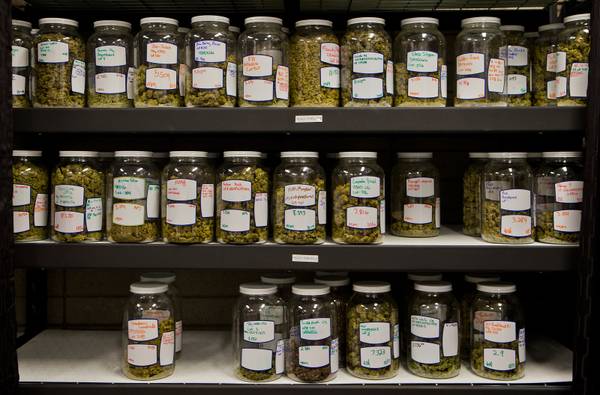One year into the legalization of recreational marijuana in Nevada, more than half the state’s pot sales are still taking place on the illegal market, said the president of the state’s leading cannabis advocacy association.
Andrew Jolley, head of the Nevada Dispensary Association and owner of The+Source dispensaries, said high taxes and regulatory costs have dissuaded customers from buying marijuana at state-regulated dispensaries. Instead, as much as 60 percent of Nevadans are purchasing their pot from street dealers for a fraction of legal dispensary prices, he told a group of about 100 Tuesday at the Las Vegas Medical Marijuana Association’s monthly luncheon.
“Most of the time, your neighbor is selling for cheaper than a dispensary and neither of you are going to get in trouble,” Jolley said. “Unless your neighbor has an RV full of marijuana.”
Jolley also lamented a steady falloff in Nevada’s medical marijuana industry over the past 12 months since the recreation program started. He said medical customers are not being incentivized enough to renew their state issued cards, which cost $100 and require a doctor’s recommendation.
Despite being exempt from a 10 percent excise tax on purchases charged to recreational customers, medical cardholders have dropped from a high of more than 28,000 in May 2017 to less than 17,000 in June, according to the Nevada Division of Public and Behavioral Health. Jolley said a reduction or elimination of taxes on medical sales, similar to how Colorado runs its medical program, would bring more people back to Nevada’s medical marijuana program.
“We don’t tax prescriptions for medical patients,” Jolley said. “I’m not sure medical marijuana is that much different.”
Stopping illegal marijuana delivery companies, which often pose as legal dispensaries, will be at the forefront of the industry’s priorities for the 2019 legislative session, Jolley said. A provision in state law allowing adults to apply for state-issued marijuana employee agent cards provides an “official” badge for illegal dealers to show their delivery clients, strengthening their bogus claims to be licensed services.
Only state-licensed dispensaries and partnering third-party delivery services are allowed to transport marijuana to clients’ homes, according to the Nevada Department of Taxation, the industry’s regulating body. But illegal delivery services have gone as far as purchasing billboards on Interstate 15 to trick unknowing buyers and interfere in the legal market.
Jolley said the average age of the hundreds of daily customers to enter The+Source is 41 years old. He said “very few” of his customers are in their 20s, but estimated that lower prices brought by lower taxes would help bring in a younger demographic.
“It’s simple economics — if you can buy a high-quality product at the same price as the street, people will come,” he said.
Through 11 months of documented recreational sales data, the state has collected $62.6 million in taxes between a 10 percent excise tax on recreational marijuana sales and a 15 percent wholesale tax on both medical and recreational shipments. The taxation department reported more than $380 million in marijuana sales during that time.


